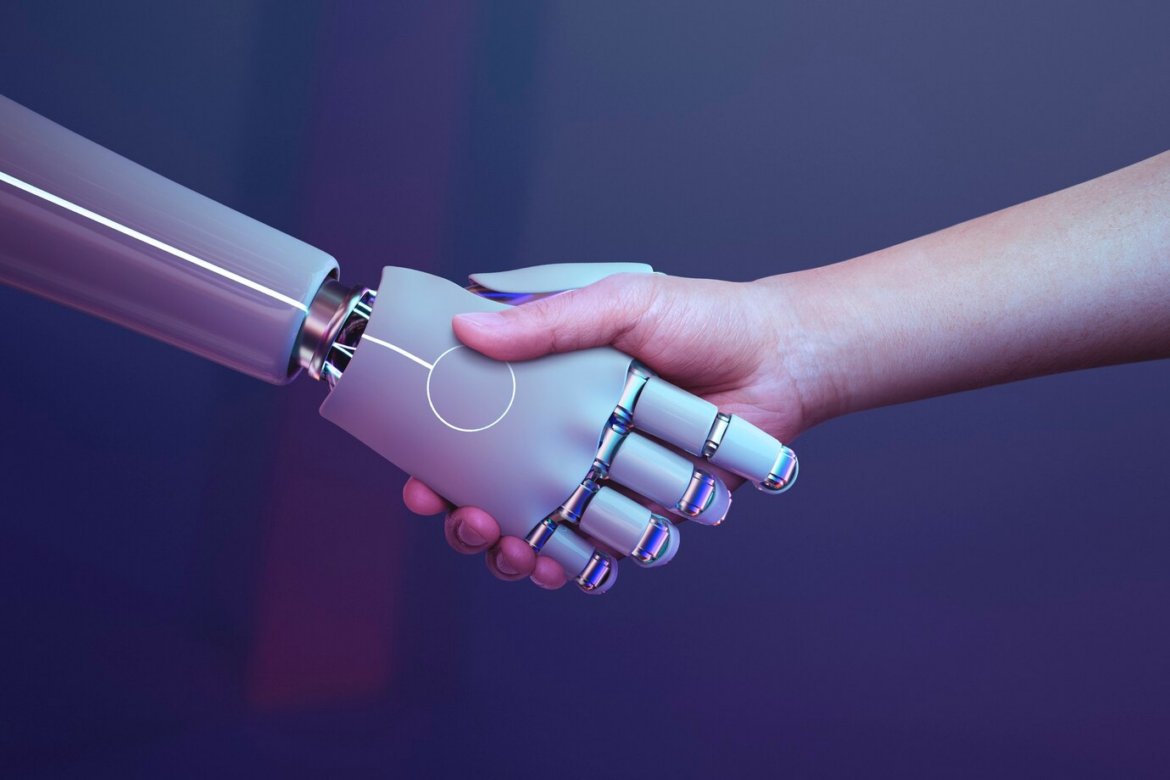Table of Contents
Generative AI is a subset of artificial intelligence that focuses on creating new content. It has recently revolutionized various industries by enabling unprecedented creativity and efficiency. From generating realistic images and videos to composing music and writing articles, the applications of generative AI are vast and transformative.
However, with great power comes great responsibility. As we continue to push the boundaries of what generative AI can achieve, it is crucial to address the ethical implications that accompany this innovation. This is where generative AI consulting comes in. These experts can help businesses navigate the complex landscape of generative AI, ensuring they leverage its potential ethically and responsibly.
In this article, we’ll explore the delicate balance between fostering innovation and upholding ethical standards in generative AI.
What Is Generative AI?
Generative AI, or GenAI for short, can perform new data creation tasks, including text, images, music, and even videos. These algorithms learn patterns from existing data and generate outputs similar to the data they were trained on. The results are often indistinguishable from human-created content.
So, how does the generative AI model work? The models are trained on vast amounts of data, like all the text and images on the Internet. This data teaches the model the patterns and structures of real-world information. Once trained, the model can use its knowledge to create new things. For example, it could write a poem in Shakespeare’s style or generate a photorealistic image of a cat wearing a hat.
Generative AI Applications
GenAI is employed in various use cases across many industries. Following are some common examples of its applications.
- Creative Era
Generative AI has made significant inroads into the creative field, offering new tools and possibilities for artists, designers, musicians, writers, and other creative professionals. In film and animation, it assists in scriptwriting and generating animations, while in game development, it dynamically creates game levels and characters. Additionally, AI enhances photography, generates ad copy and visuals for marketing, and aids architectural design by offering multiple design proposals and detailed 3D models.
- Marketing and Advertising
Generative AI helps create eye-catching marketing materials or tailor content to specific audiences. This could involve generating personalized ads, crafting social media posts, or writing blog articles that resonate with specific demographics.
- Product Design
GenAI technology can be used to brainstorm new product ideas or refine existing designs. For instance, it allows you to generate variations of a product package or create 3D models for prototyping.
- Scientific Research
Generative AI is significantly advancing scientific research by accelerating discovery, enhancing data analysis, and enabling the creation of new hypotheses and models. In drug discovery, it designs novel molecular structures and predicts interactions, while in material science, it creates materials with specific properties and predicts their behavior. In terms of healthcare, GenAI enhances medical imaging and personalized medicines.
Ethical Implications of Generative AI
While generative AI offers numerous benefits, it also raises several ethical concerns, not only regarding data privacy and security but also regarding bias and misinformation.
Privacy Concerns
Data Collection and Usage – As mentioned, Generative AI often relies on vast amounts of data, raising questions about consent and data ownership. The data used to train these models can include personal information. Still, if it’s not handled properly, it can lead to privacy violations.
Anonymity and Data Security – It’s critical to ensure data used in training models is anonymized and secure.
Bias and Fairness
Biases in Training Data – AI models can perpetuate and even amplify existing biases in the data they are trained on, which may cause unfair and discriminatory outcomes.
Mitigation Strategies – It’s necessary to identify and mitigate biases in training data and model outputs. The collected data must be diverse and representative, and algorithmic fairness techniques must be used.
Intellectual Property and Ownership
AI-Generated Content Ownership – Determining who owns the rights to content created by AI is a complex issue. Should it be the developer, the user, or the AI itself?
Copyright Issues – GenAI models can create content similar to existing copyrighted works. This raises questions about ownership and fair use of the generated material. Clear guidelines on handling intellectual property rights in the context of AI-generated content are needed.
Accountability and Transparency
Decision-Making Processes – Understanding how AI models arrive at their outputs is crucial for accountability. Nobody can ensure that black-box models, where the decision-making process is not transparent, are not problematic.
Explainability of AI Models – Making AI models interpretable and transparent helps build trust and ensures ethical use. Users should be able to understand and challenge the decisions made by AI systems.
Social and Economic Impact
Job Displacement and Economic Inequality – Automation driven by generative AI can lead to job losses and widen economic disparities. It is important to consider AI’s social impact and take steps to mitigate negative consequences.
Ethical Use in Media and Entertainment – You should ensure that AI-generated content is used responsibly and does not spread misinformation. The potential for deep fakes and other malicious uses of generative AI is a significant concern, as they pose significant risks to public trust and can have serious societal consequences.
Balancing Innovation and Responsibility
Striking a balance between innovation and responsibility in generative AI is a critical and complex task that requires a multi-faceted approach. It involves multiple stakeholders, including researchers, developers, policymakers, and the public.
Ethical Frameworks and Guidelines
Organizations like the IEEE and the European Union have established comprehensive guidelines to foster ethical AI development. These guidelines serve as a crucial foundation for responsible AI practices, ensuring that AI technologies are developed and deployed in ways that respect human rights, promote fairness, and mitigate potential harms. By adhering to these established ethical standards, developers and organizations can navigate the complex landscape of AI with a clear framework that prioritizes ethical considerations.
However, the rapid advancement of generative AI necessitates the development of new, tailored ethical frameworks to address its unique challenges. Generative AI presents specific ethical issues that differ from other AI applications. Developing specialized ethical guidelines for generative AI enables stakeholders to effectively address these challenges, ensuring that the technology is used responsibly and ethically in contexts of content generation.
Best Practices for Developers
Incorporating ethics into the AI development lifecycle ensures that ethical considerations are not an afterthought but a fundamental aspect of the entire process. Developers should conduct thorough ethical impact assessments from the initial design phase to deployment to identify potential risks and address them proactively. Involving diverse stakeholders in the development process brings a variety of perspectives and expertise to the table, helping to create more inclusive and fair AI systems.
Regular audits and assessments will maintain the ethical integrity of AI systems over time. Continuous monitoring and evaluation can help identify emerging ethical issues and ensure AI systems comply with established ethical standards. This ongoing vigilance is necessary to adapt to new challenges and evolving ethical considerations so AI systems can continue to operate ethically, transparently, and accountable.
Role of Policymakers and Regulators
Laws and regulations should be enacted to ensure ethical AI development and use. Policymakers should work with industry experts to create regulations that promote innovation while protecting public interests.
By adhering to established industry standards, companies can create a unified approach to ethical AI practices that transcend national boundaries and regulatory differences. These standards provide a benchmark for best practices, helping organizations align their AI systems with ethical principles and societal expectations. Companies should take proactive steps to ensure their AI systems are ethical and responsible.
Public Awareness and Education
It’s necessary to increase public understanding of AI technologies and their implications. Both governments and organizations should provide accessible information about how AI works and its potential impact on society.
Also, encouraging ethical use of AI-generated content can help mitigate negative impacts. Users should be aware of the ethical considerations and potential risks associated with generative AI.
The Role of Generative AI Consultants in Ensuring Ethical Implications
Generative AI consultants play a crucial role in this process. Their expertise in ethical AI practices, risk assessment, and regulatory compliance helps organizations navigate the complex ethical landscape of generative AI.
They are well-versed in fairness, accountability, transparency, and privacy – the core principles of ethical AI. They can advise on mitigating bias in training data, ensure transparency in how generative AI models arrive at their outputs, and protect user privacy throughout the development and deployment process.
By engaging these professionals, organizations can enhance trust, mitigate risks, and innovate responsibly, ensuring that generative AI technologies are developed and deployed to align with ethical standards and societal values.
Final Thoughts
Generative AI holds great potential to drive innovation and transform industries. However, it’s important to balance this innovation with ethical responsibility. By adhering to ethical frameworks, implementing best practices, and fostering public awareness, we can ensure that generative AI is developed and used to benefit society as a whole.









